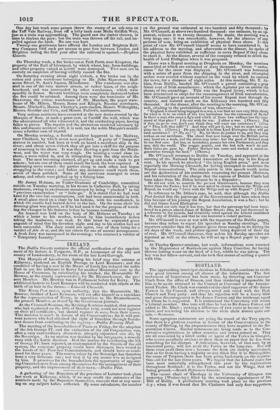A gatherings of' the Repeaters of the province of Leinster
took place last week at Kilkenny, which, if we may credit the estimates of the numbers made by the Repeaters themselves, exceeds that at any meet- ing on any subject before collected. By some calculators, the number on the ground was estimated at two hundred and fifty thousand ; by Mr. O'Connell, at above two hundred thousand: one estimate, by an op. ponent, reduces it to twenty thousand. No doubt, the meeting was a very large one : it was remarkable, however, for the absence of any
persons of note, being an exhibition of physical force alone. Li this point of view Mr. O'Connell himself seems to have considered it. In his address to the meeting, and afterwards at the dinner, he spoke of the physical force exhibited as sufficient to carry Repeal if they chose to exert it. At the dinner, several of the company refused to drink the health of Lord Ebrington when it was proposed.
There was a Repeal meeting at Drogheda on Monday, the 'numbers assembled at which are estimated at sixty thousand. Great " enthu- siasm " for the cause was displayed. Mr. O'Connell was honoured with a salute of guns from the shipping in the river, and triumphal arches were erected without number on the road by which lie entered the town, for a distance of eight miles. At this meeting, Mr. T. At-
kins, from Dublin' banded Mr. O'Connell a parcel containing a gray frieze coat of Irish manufacture ; which the Agitator put on amidst the
shouts of the assemblage. This was the Repeal livery, which it had been determined to adopt for the encouragement of Irish manufactures. Mr. O'Connell gave an account of his recent Repeal tour through the
country, and insisted much on the Kilkenny two hundred and fifty thousand. At the dinner, after the meeting in the morning, Mr. O'Con- nell, alluding to the probabilities of war, observed- " England is about being engaged in a war, a war that we care very little about, for what is it to us which of the two barbarians has the command of Syria? Is there a man who cares a fig's-end which of these two ruffians has the com- mand of that place ? 1 do not wish for war. I abhor a war. (Cheers.) But if they do go to war, don't you think they will want our assistance ? (Cries of " They will, they will! ") And they will get it, too ; but we must have our price for it. (Cheers.) Do you think it is from Lord Elnington they will ges such assistance? ("11h, no ") No, let them do justice to us, and they may
reckon on our assistance. The cloud that now hangs over the British nation
may burst ere a week, and the storm may arise: but the good of Ireland must be our first care. Let her, as heretofore, possess her own Parliament, and they may defy the world. The magpie prattle, and the bad talk won't do nom Such times are gone by.. Father Mathew has come and worked a moral re- generation through the land." (Cheers.)
Mr. O'Connell returned to Dublin on Tuesday, and appeared at the meeting of' the National Repeal Association on that day in his Repeal
coat. In his speech he attacked " the lying English press," and more especially the Morning Chronicle, for having attempted to moderate the Repeal demonstrations. The only points in this speech worth notice are the declaration of his sentiments respecting the present Ministers, and his reiteration of the charge that the custom of Dublin Castle had been taken from Mr. Dillon because he is a Repealer— He did not wish to unsettle the proent Government, because they were better than the Tories ; but if he were asked to choose between the Whigs and Repeal, he would say "down with the Whigs and up with Repeal." (Cheers.) In reference to Mr. Dillon's case, he said, that although the Dublin Post denied that the patronage of the Government had been taken from him because of his joining the Repeal Association, it was a fact ; but he did not blame Lord Ebrington- Be found not only that it was true, but that the patronage had been trans- ferred to a person named Jones of Kildare Street; who, he had discovered by a reference to the records, had invariably voted against the Liberal candidates for the city of Dublin, and that he was moreover a violent partisan.
Mr. O'Connell is now at war with the reporters of the Dublin papers, because they refuse to report his speeches at Sunday meetings. The
reporters consider that the Agitator gives them enough to do during the six days of the week, and protest against hieing deprived of their day of rest. Mr. O'Connell threatens, that unless his Sunday speeches are reported as well as the others, he will set up a Repeal paper in oppo- sition.
At Thurles Quarter-sessions, last week, informations were returned by the Magistrates of Borrisokane against Mary Costelloe, for having thrown boiling water on the head of a boy, whilst he was asleep. The boy was her fellow-servant, and she took that means of settling a quarrel with him.


























 Previous page
Previous page